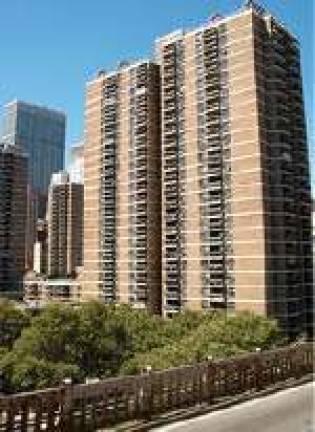Downtown Tower Residents at a Crossroads

Privatization vote for 1,651-unit Mitchell-Lama complex set for the end of September
Financial District Residents of Southbridge Towers, a housing complex at the foot of the Brooklyn Bridge downtown, have had years to consider whether or not to leave the protection of the Mitchell-Lama affordable housing program in exchange for owning their apartments, but never has the possibility been as tantalizingly close ? or fraught ? as it is now. The deciding vote, long-delayed and much discussed, is less than two months away.
Shareholders in the complex met last Tuesday to discuss the prospect in what is likely to be the last formal shareholders meeting before a decision is made.
The Mitchell-Lama program was created in the 1950s as a way to establish and sustain affordable housing for middle class New Yorkers. In exchange for real estate tax breaks and low interest mortgages, Mitchell-Lama co-op shareholders agree to keep rents and purchase prices far below market rate. After 20 years in Mitchell-Lama, a participating co-op corporation can voluntarily exit the program with a two-thirds vote. To date, 93 Mitchell-Lama developments with 31,700 units have voted to exit the program in what's called a buyout or privatization.
At Southbridge Towers, a 1,651-unit complex spread among a series of buildings in the Financial District, the question of whether to privatize goes back to 2005, when shareholders voted to conduct a feasibility study on whether such a plan made financial sense.
The mechanics of privatizing are complicated ? it takes a 900-page prospectus to explain - but proponents of the plan say it will lead to a windfall of equity for those shareholders who decide to put their apartments up for sale at market rate, which is the stated outcome of privatization and the reason the process is called a buyout.
But opponents of the plan say privatizing is a gamble that isn't worth the risks, which they say come down to a host of unknowns.
For instance, will the state's Real Estate Transfer Tax affect those looking to sell their unit after privatization? That question is currently tied up in a court case between one of Donald Trump's properties and the city and won't be resolved until after the vote.
And what of the asbestos that's in the units and common areas at Southbridge Towers?
Also at stake is the maintenance ? or rent ? at Southbridge Towers, which could increase dramatically if privatization passes for those who choose to stay in their units and not sell. The question of how much they could rise is dependent on how many units sell.
According to the prospectus, owners who sell their units after privatization have to pay a 28-33 percent "flip tax" back to the co-op corporation, money that will keep the maintenance fees flat for those who choose to stay after privatization. However, those fees will only stay flat if three percent of apartments are sold each year.
Opponents also say giving up over 1,600 affordable units in the heart of Lower Manhattan is unconscionable and hurts the many thousands on a waiting list to get into a Mitchell-Lama apartment.
"I would not choose to make money after being subsidized for over 40 years and deny others from having the same opportunity," said Paul Hovitz, who formed the anti-privatization Southbridge Towers Tenants Association last year to combat the forces of pro-privatization.
For opponents of the plan, the protections afforded by Mitchell-Lama far outweigh the benefits of owning and controlling the destiny of their apartment. Still, the prospect of suddenly owning a market-rate apartment in prime real estate like the Financial District is attractive to many shareholders.
Stuart Saft, an attorney with Holland and Knight who heads their New York real estate division, was hired to conduct the feasibility study and spoke to shareholders about the privatization deal at the meeting last Tuesday. According to a valuation that was conducted as part of the prospectus, shareholders stand to gain, depending on the size of their unit, anywhere from $300,000 to $1.3 million if Southbridge Towers privatizes and they sell.
Saft admitted the deal was complicated when he quipped that it was, "written for lawyers by lawyers, who obviously get paid by the page."
As for the Real Estate Transfer Tax, Saft and other lawyers involved say it's extremely unlikely that it will apply. Asbestos abatement is also available for a nominal dollar amount when compared with what shareholders stand to gain.
"If the people who are opposed to the plan really felt that there was a real asbestos problem, they would have moved out of their apartments years ago," said Saft.
Southbridge shareholders will need a two-thirds majority vote for privatization. (Abstaining from the vote is equal to a vote against privatization.) The vote is scheduled for the end of September.
Robert DuBois, an anti-privatization insurance adjuster and former mortgage banker, said for the past six years pro-privatization and pro-Mitchell-Lama groups have been waging war for control of the board.
"The campaign to go private has been going on for the better part of a decade and has the place deeply divided," said DuBois. "The vote will be harrowingly close."